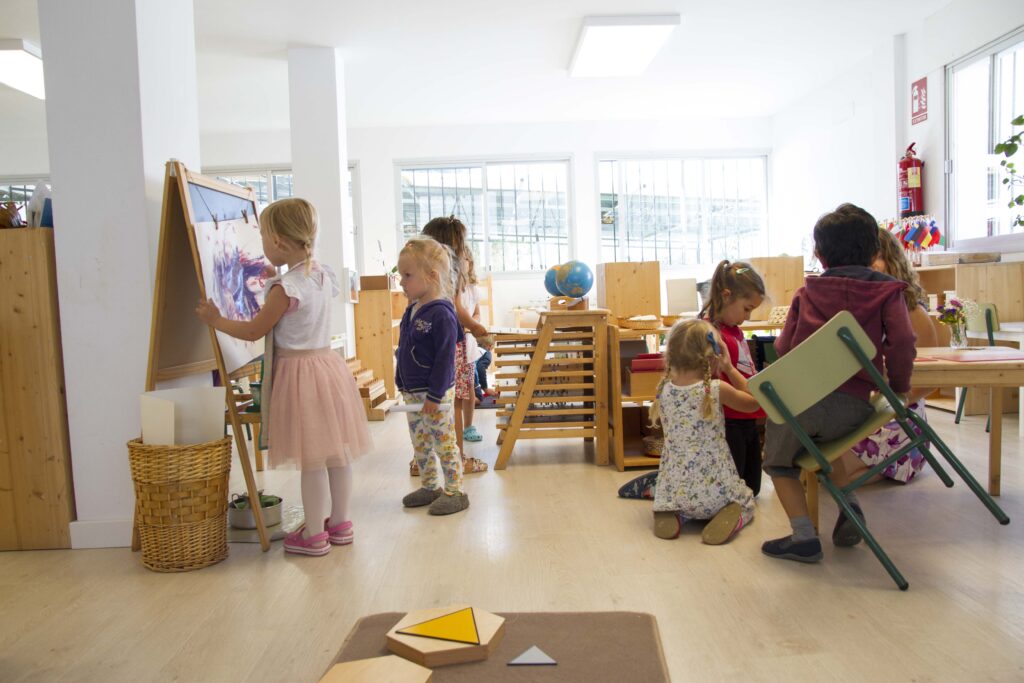Why Montessori works
The simplest reason the Montessori Method works is that it meets the developmental needs of children.
With Montessori theory and practice, each child creates a custom course of study through self-selected activities, guided by a trained Montessori teacher in a carefully designed environment.
Eagles Childcare Center offers an authentic Montessori education following the principles and practices established by the Association Montessori Internationale (AMI).
- Mixed Age Classrooms: Placing children in mixed age groups, corresponding to planes of development, allows them to relate to children who are both older and younger. It also allows them to develop and learn at their own pace and so that a child is not labeled as either behind or gifted simply because they acquire a concept a little earlier or a little later than same age peers.
- Developmental: Awareness of the needs and abilities during specific times of development allows for optimal engagement and learning for the child.
- Child-centered: The classroom community is child-centered rather than adult-centered.
- Active Learning: Learning is experiential at all levels. The use of self-correcting materials allows children to manipulate and explore at their own pace and experience satisfaction and develop self-confidence with success.
- Multi-modal Learning: Learning happens through movement, touch, sight and sound. From 6 years old the learning is not limited to the materials in the classroom and many learning and outings are planned by the children to pursue their interest.

Learn with Others, Live in Harmony
In Montessori environments, children experience life as part of a mini society that mirrors real-world experiences. Up until age 6, children possess an “absorbent mind,” eagerly seeking to understand and be part of their environment. They naturally imitate adults by wanting to cook, serve water, dress themselves, and complete tasks independently, driven by a desire to participate in life.
Adults in the Montessori space encourage these impulses, allowing children to engage in daily activities, acquire new skills, and develop a sense of ownership. Clear agreements guide this freedom, ensuring that children can make their own choices while respecting the freedom of others.
Capacity for Choice, Motivation, Freedom, and Will
Free choice in Montessori environments gives children the joy of pursuing activities aligned with their personal interests and developmental needs. By paying close attention to each child’s desires, teachers provide the materials and opportunities necessary for their growth, empowering them to follow their innate curiosity and will.
During the first stage of development (birth to age 6), children are focused on getting to know themselves and their place in the world. They observe and understand what they can contribute, shaped by their unique and irreplaceable identity. The development of willpower is nurtured by the environment, which offers opportunities for choice, patience, and focus.
In Montessori environments, materials are available for children to engage with freely. Sometimes, waiting for a turn to use a material teaches them patience and self-control. Uninterrupted work periods of over three hours give children the freedom to organize their activities—whether working, eating, going outside, or resting—at their own pace. This extended time helps build a child’s will, allowing them to work on tasks for as long as they need, boosting their sense of achievement and self-confidence.


Sensitive Periods
Dr. Maria Montessori identified “sensitive periods” as unique windows of opportunity in a child’s development, during which they are especially receptive to learning specific skills, such as order, sensory refinement, language, and movement. These periods are moments when children show intense interest in certain activities, allowing them to grasp concepts more easily than at any other time in life. Montessori classrooms are carefully designed to cater to these sensitive periods, ensuring that children can explore and learn during these optimal stages of development.
Child-Led Learning
In Montessori programs, the day typically begins with a work cycle, followed by circle time or a calming activity. The rhythm and structure of the day are important, as they create a sense of security for children who thrive when they know what to expect. Starting the work cycle at a consistent time each day reinforces this feeling of safety.
During the work cycle, students explore topics at their own pace, allowing for uninterrupted focus. Younger children might engage with a task for just a few minutes, while older students may concentrate for hours. This daily work cycle is an essential part of the curriculum, helping to develop concentration and self-direction.




